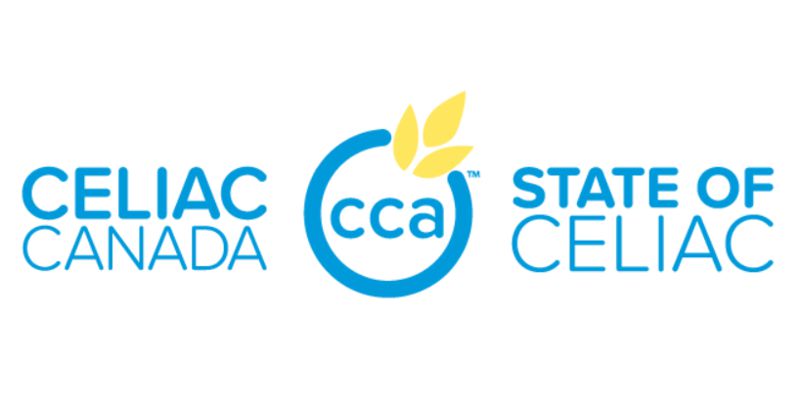STATE OF CELIAC DISEASE IN CANADA – UNDERDIAGNOSED, UNAFFORDABLE AND UNSAFE FOOD: SURVEY

20 years after first survey, little has changed for hundreds of thousands of Canadians living with celiac disease
Toronto, ON. February 27th, 2024. Twenty years after the first comprehensive survey of Canadians living with celiac disease, new results show the condition remains largely underdiagnosed, the gluten-free diet is often unaffordable, and many risk being exposed to unsafe food.
“Sadly, the biggest challenges haven’t improved in twenty years – like getting people with celiac disease properly diagnosed early, and ensuring they’re able to afford gluten-free foods that won’t do them harm,” explains Melissa Secord, National Executive Director of Celiac Canada, which funded the survey “State of Celiac Disease in Canada: 20 Years Later.”
“Celiac disease is a common genetic disorder that affects about one percent of the world’s population, but up to 80% still don’t even know they have it. So, they’re living with painful, life-disrupting symptoms and unwittingly causing themselves harm. For those who have been diagnosed, the unaffordable cost of gluten-free foods often means having to skip meals, change the food they purchase or make sacrifices in other areas of their spending.”
Celiac disease is an auto-immune condition triggered by ingesting gluten (a naturally occurring protein) in grains such as wheat, rye and barley. The body attacks itself, damaging the small intestine and resulting in malabsorption of vital nutrients. Damage can lead to a variety of over 260 possible gastrointestinal and extraintestinal symptoms; the top ‘non-gut’ symptoms are now neurological such as anxiety (58.9%), brain fog (57.4%) and headaches and migraines (52.6%). Long delays in diagnosis can cause co-morbidities and early death from complications.
Celiac Canada surveyed 7,500 Canadians with celiac disease on topics like what symptoms they experience, how long they went before being diagnosed, and how they manage living with the disease (eating challenges in social settings, the availability and cost of gluten-free food, and the psycho-social challenges of managing celiac disease).
Among the key findings of the survey:
- DELAYS IN DIAGNOSIS: While general awareness of gluten-free diets as a fad has risen in the last 20 years, there has been no significant reduction in the amount of time it can take for people with symptoms to be properly diagnosed – as long as 10 years, in most cases.
- CHANGING SYMPTOMS: 4 out of the 10 top symptoms in more recent years are neurological (anxiety, brain fog, mood swings/irritability, headaches/ migraines) versus more traditional celiac disease symptoms like bloating, gas and diarrhea.
- AFFORDABILITY: Most respondents (75%) say the cost of the gluten-free is their top concern, which impacts the dietary choices they make. Gluten-free foods can cost from 150% to 500% more than their conventional counterparts, representing an average additional cost of $1,000 per year per adult. Incremental tax relief offered by the federal government is insufficient and complicated– only 20% of respondents have taken advantage of it – and people in the lowest income categories (those who need help the most) don’t even qualify.
- RISK OF UNSAFE FOODS: Three-quarters of respondents (75.5%) who have been in hospitals or care homes say it’s difficult getting gluten-free food in those settings.
- MENTAL HEALTH: More than half reported feelings of frustration and isolation from having to follow a gluten-free diet. They also say it affects their participation in social events and causes stress in food preparation and interactions with friends, family and work colleagues. Respondents continue to be wary of or fear options in restaurants using confusing and unregulated language such as “gluten-friendly” or “gluten aware” menu items.
What can be done to help Canadians living with celiac disease?
- MORE DIAGNOSIS, FASTER
· Have all provinces add blood tests for celiac disease to the standard requisition used by family doctors.
· Develop and implement new guidelines to improve diagnosis rates and standards of care – to put celiac disease on the radar of front-line family doctors and healthcare professionals.
· Help healthcare professionals better recognize the increasing neurological and mental health signs of celiac disease (neuropathy, migraines, depression, anxiety) and not just the traditional disease symptoms (like bloating, weight loss, diarrhea).
- HELP WITH THE HIGH COST OF GLUTEN-FREE FOODS
· Introduce a flat-rate federal income tax claim of at least $1,000 per adult and $600 per child to provide true financial relief from the cost burden of the gluten-free diet.
- ENSURE AVAILABILITY OF SAFE FOODS OUTSIDE THE HOME
· Require all publicly funded health institutions (hospitals, long-term care homes, treatment facilities or assisted living homes) to provide adequately funded, safe gluten-free foods.
· Develop regulations for official and standardized allergen and gluten menu declarations in food service delivery (restaurants, facilities, airlines, etc.) to protect all Canadians with medical dietary needs.
· Develop regulations to truly reflect product content and to standardize the acceptable use of “gluten-free” on food labels.
READ FULL SURVEY https://www.celiac.ca/state-of-celiac
· We acknowledge funding support from Takeda Pharmaceuticals, the Ottawa Celiac Canada Chapter, Promise Gluten-Free, and many donors and local CCA chapters for making this happen.
ABOUT CELIAC CANADA
Since 1972, Celiac Canada (CCA) has been the only national charity championing how to find, treat & cure celiac disease so people can safely manage their lifelong gluten-free journey. A united hub for the best medical, lifestyle and policy solutions that improve your access to safe gluten-free food, standards of care & world-class education/research. CCA changes minds, hearts, laws & lives.
Source: westerngrocer.com


